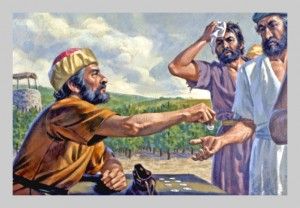Growing up I recall my mother speaking from fond memory of her love for all her Benedictine Sister-teachers she knew from Ridgely, MD. She had been double-promoted from seventh grade into high school. But, there was no Catholic high school and she didn’t particularly like the public school setting. At fourteen (14) she did what a lot of young people did. She dropped out, got a work permit and joined her sister in Atlantic Beach to wait tables. Later she became a nanny and housekeeper for a family that were loyal to her long after she married at age 33. At some point I asked her why she hadn’t become a Sister since she obviously loved them – she could name them all from Sister Philomena in first grade to Sister Florentine (for whom she took her Confirmation name) in her last grade at St. Elizabeth’s. Her answer to my query echoes that of the 5 o’clock men in this Gospel parable: “No one asked me.” Adding – “I figured I wasn’t good enough.” (“But, then, I wouldn’t have had you.”)
It strikes me that this Gospel must be a source of reassurance to those that some may describe as “late or delayed vocations.” When the 5 o’clock whistle blew the men in the parable figured they’d been overlooked again. “Don’t I look strong enough? What will I say to my wife and children?” The parable described these hopefuls as “standing around” but if you have seen day laborers gathered, hopefully waiting for a grove owner’s bus, you’ve seen some of them – already weary before the day has begun – sitting on a bench or crouched on their haunches. Their experience warning them once again there’d be no room for them on the bus.
So, they’re there – well, into the day – 5 o’clock the parable says – discouraged – AGAIN – picturing their children with hunger in their eyes. But, (wait) maybe (just maybe) they could pick up a few hours work but dark. Either way, their ears pricked up when they heard the voice of the landowner, the Master: “Why are you still here? You, too, go into my vineyard.”
What a surprise a short while later, when they looked into their pay envelopes to discover a full day’s wages! (Now, unlike the parable of the 10 lepers made clean, Matthew does not tell us how many said “thank you.”)
Is it possible, they discretely peeked in their envelopes, thinking, “He’s usually generous – wonder how much I got – will it put supper on the table? Mmmm, I better not act too surprised or delighted lest the early birds notice what’s occurred. I would venture a guess that these “Johnny come lately” guys might decide they better not push their luck tomorrow … lolly-gag or deliberately arrive late to join the guys on the bench.
(Enough of my imagining.) The whole Gospel story harkens back to a line from the First Reading from Isaiah: (God speaks) – “My thoughts are not your thoughts, nor are your ways my ways” … (God, the Lord or to use the term in the Gospel – the Master, continues emphasizing how far apart God’s thoughts are from ours). “As high as the heavens are above the earth, so high are my ways above your ways, and my thoughts above your thoughts.” With that consideration in mind, (that God’s thoughts are a far cry from our earth-bound thoughts) jump to the last line in the Gospel parable: … “Am I not free to do as I wish with my own riches? Are you envious because I am generous?” [Has God ever had to ask that question of you?]
Isn’t this exactly Benedict’s point when he reminds his followers (well, he directs much to the abbot or prioress … but even the “grace of office” can’t work a transformation if the one elected isn’t already steeped in these traits.) As one of the speakers said in Thursday’s evening’s ZOOM presentation on Racism: “A change in attitude doesn’t guarantee in a change in behavior.”
While we are “sitting on the bench we call life” we should not be “standing around idle” waiting to be hired – there is much to be done. The Rule offers us a good material for a personal check list:
(From RB 2) “Honor all persons. Show no favoritism, but have respect for all. (RB 27 and 34) Any favoritism should be shown for the weak. (RB 2 and 27) Accommodate a variety of lifestyles; don’t exercise any form of tyranny. (RB 62) Follow what you consider better for others. No favoritism will be given due to rank or status. (RB 3) Even the youngest should be heard with respect in community deliberations. (RB 59) No distinction between rich and poor; respect all equally.”
In regard to respect for individual pathways to holiness, Benedict says in RB 73: there is always more you can do. Those who can do more, should do so. “As observant and obedient monk, we blush for shame at being so slothful, so unobservant, so negligent. Are you hastening toward your heavenly home? Then, with Christ’s help, keep this little rule … After that, you can set out for the loftier summits of teaching and the virtues, and under God’s protection you will reach them.”
Can you hear the landowner asking: “Why are you standing here idle all day? Go into my vineyard and I will give you what is just.”
~Reflection by Sister Roberta Bailey, OSB



Leave a Reply